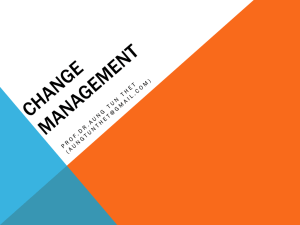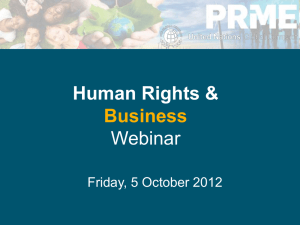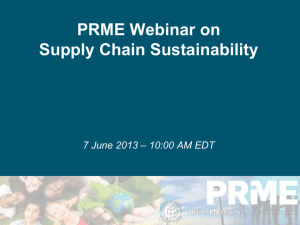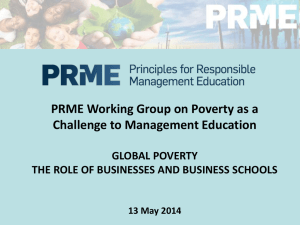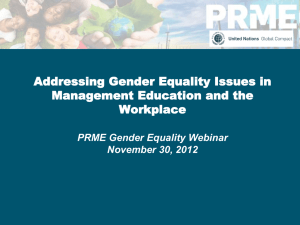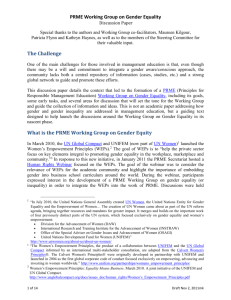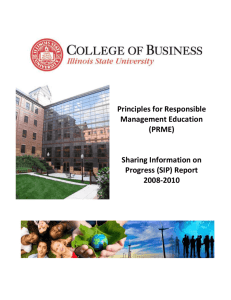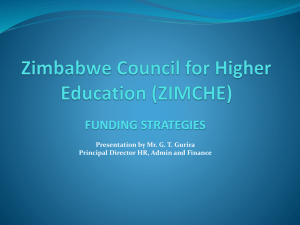We, the representatives and stakeholders of the world*s management
advertisement
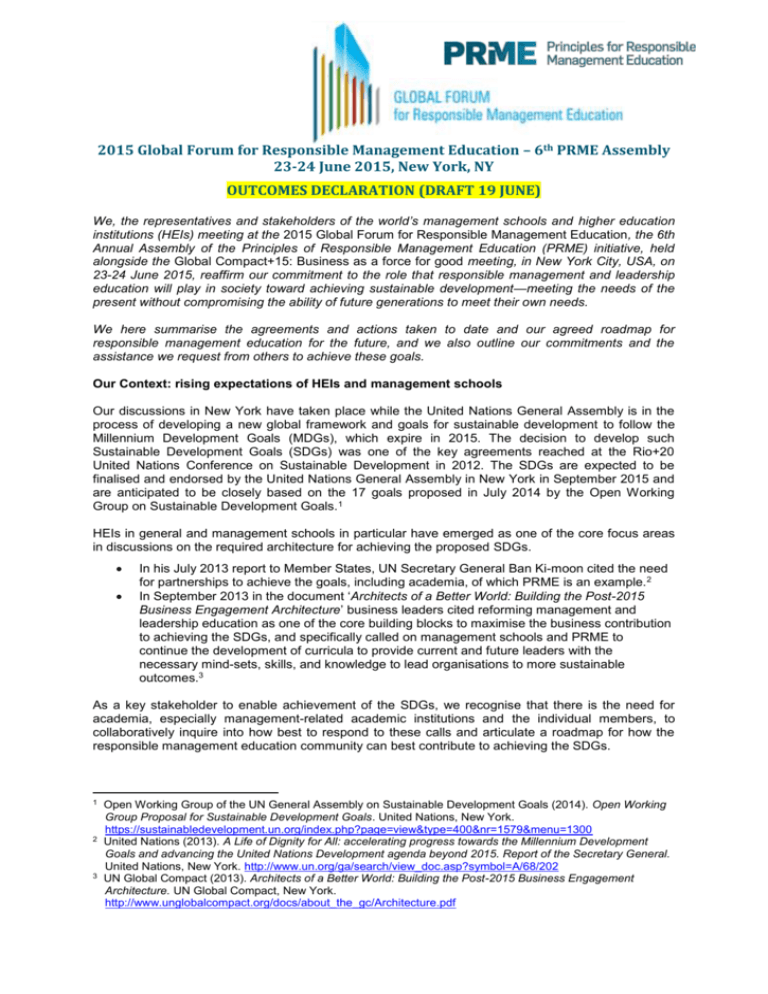
2015 Global Forum for Responsible Management Education – 6th PRME Assembly 23-24 June 2015, New York, NY OUTCOMES DECLARATION (DRAFT 19 JUNE) We, the representatives and stakeholders of the world’s management schools and higher education institutions (HEIs) meeting at the 2015 Global Forum for Responsible Management Education, the 6th Annual Assembly of the Principles of Responsible Management Education (PRME) initiative, held alongside the Global Compact+15: Business as a force for good meeting, in New York City, USA, on 23-24 June 2015, reaffirm our commitment to the role that responsible management and leadership education will play in society toward achieving sustainable development—meeting the needs of the present without compromising the ability of future generations to meet their own needs. We here summarise the agreements and actions taken to date and our agreed roadmap for responsible management education for the future, and we also outline our commitments and the assistance we request from others to achieve these goals. Our Context: rising expectations of HEIs and management schools Our discussions in New York have taken place while the United Nations General Assembly is in the process of developing a new global framework and goals for sustainable development to follow the Millennium Development Goals (MDGs), which expire in 2015. The decision to develop such Sustainable Development Goals (SDGs) was one of the key agreements reached at the Rio+20 United Nations Conference on Sustainable Development in 2012. The SDGs are expected to be finalised and endorsed by the United Nations General Assembly in New York in September 2015 and are anticipated to be closely based on the 17 goals proposed in July 2014 by the Open Working Group on Sustainable Development Goals. 1 HEIs in general and management schools in particular have emerged as one of the core focus areas in discussions on the required architecture for achieving the proposed SDGs. In his July 2013 report to Member States, UN Secretary General Ban Ki-moon cited the need for partnerships to achieve the goals, including academia, of which PRME is an example. 2 In September 2013 in the document ‘Architects of a Better World: Building the Post-2015 Business Engagement Architecture’ business leaders cited reforming management and leadership education as one of the core building blocks to maximise the business contribution to achieving the SDGs, and specifically called on management schools and PRME to continue the development of curricula to provide current and future leaders with the necessary mind-sets, skills, and knowledge to lead organisations to more sustainable outcomes.3 As a key stakeholder to enable achievement of the SDGs, we recognise that there is the need for academia, especially management-related academic institutions and the individual members, to collaboratively inquire into how best to respond to these calls and articulate a roadmap for how the responsible management education community can best contribute to achieving the SDGs. 1 2 3 Open Working Group of the UN General Assembly on Sustainable Development Goals (2014). Open Working Group Proposal for Sustainable Development Goals. United Nations, New York. https://sustainabledevelopment.un.org/index.php?page=view&type=400&nr=1579&menu=1300 United Nations (2013). A Life of Dignity for All: accelerating progress towards the Millennium Development Goals and advancing the United Nations Development agenda beyond 2015. Report of the Secretary General. United Nations, New York. http://www.un.org/ga/search/view_doc.asp?symbol=A/68/202 UN Global Compact (2013). Architects of a Better World: Building the Post-2015 Business Engagement Architecture. UN Global Compact, New York. http://www.unglobalcompact.org/docs/about_the_gc/Architecture.pdf 2015 PRME Global Forum – Outcomes Declaration We recognise that there are clear roles for which this community is uniquely placed to play: Through education, by developing globally responsible leaders and managers with the necessary capabilities and strong commitment to sustainability, Through research and thought leadership, enabling business organisations to serve the cause of common good, and Through engaging in the transformation of business and society. 4 We affirm that PRME, as the leading network for responsible management and leadership education, in partnership with the Globally Responsible Leadership Initiative (GRLI), the Academy of Business in Society (ABIS), and other members organisations of the PRME Steering Committee, as well as affiliated groups, is well placed to act as a coordinating platform to help the management education and research community develop a view to what tangible commitments are required of HEIs to bring this roadmap to life and how to mobilise this work in collaboration with the United Nations and relevant stakeholders, such as the UN Global Compact and its business participants. We affirm that PRME is a network of networks devoted to the advancement of the SDGs through management education and research. Our journey so far As the PRME initiative marks its 8th year of existence, it has grown into a platform comprising global, regional and local networks. In 2012, at the 3rd Global Forum for Responsible Management Education in Rio de Janeiro, Brazil, we identified four main strategic goals for the PRME initiative: PRME Chapters, as local and regional platforms for dialogue, learning, and action on responsible management education; PRME Champions, as a thought and action leadership group; Implementing delisting of non-communicating PRME signatories to enhance accountability; Implementing an annual administrative service fee to increase ownership of the initiative by signatories. At the 5th PRME Assembly, the 2013 PRME Summit, hosted and co-organised by CEEMAN in Bled, Slovenia, taking into account results from previous PRME Global Fora and Summits, and on-going dialogue with different stakeholders, we affirmed our agreement to an ambitious roadmap to 2020 for management education. 5 We pledged to further enhance the impact of the PRME initiative in delivering on this roadmap through leadership at many levels: As individuals leading change within our institutions. As PRME signatory institutions to embed the Six Principles of PRME, support faculty through faculty development, and to share our progress through Sharing Information on Progress (SIP) reports. As a collective network through the PRME Champions leadership group, regional PRME Chapters, and thematic PRME Working Groups, and through calling for more HEIs to join PRME. In addition, we requested help and support to achieve these goals from other stakeholders, specifically: we urged regulators, accreditors, and ranking organisations to fully incorporate responsible management education paradigms into their standards and criteria. At our meeting in New York, we have celebrated much progress on this roadmap. In particular: 4 5 50+20 (2012). The 50+20 Agenda – Management Education for the World. 50+20, Geneva. http://50plus20.org/wp-content/uploads/2012/06/5020_AGENDA_PRINT_a4_English.pdf This roadmap is summarised in the Outcome Document from the Third Global Forum for Responsible Management Education: The Rio Declaration on the Contribution of Higher Education Institutions and Management Schools to The Future We Want: A Roadmap for Management Education to 2020 http://www.unprme.org/resource-docs/3rdPRMEGFRioDeclaration.pdf. This was built on a variety of documents prepared for the 3rd Global Forum, including the Rio Declaration for Higher Education Institutions, signed by over 200 leaders of HEIs, the Guidelines for HEIs on the Implementation of the UN Global Compact Principles in campus operations, the 50+20 Agenda – Management Education for the World, and the recommendations of the issue-specific PRME Working Groups on Anti-Corruption, Gender Equality, and Poverty as a Challenge for Management Education. 2 2015 PRME Global Forum – Outcomes Declaration We welcomed the 137 new participants that have joined PRME since our last PRME Assembly in Bled in September 2013. We celebrated the ongoing work of the regional PRME Chapter, PRME Champions and PRME Working Groups since our last meeting in Bled, in particular: - The 18 PRME Chapter and Regional Meetings. - The launch of new PRME Chapters, now counting 12 around the world. - The new resources and tools launched by different PRME Working Groups (e.g. AntiCorruption Toolkit developed by the PRME Working Group on Anti-Corruption in Curriculum Change with the support of the Siemens Integrity Initiative) and regional PRME Chapters (e.g. PRME Chapter UK & Ireland region-specific Inspirational Guide for the Implementation of PRME). - The joint meeting in July 2014 between the PRME Champions, the Global Compact Board, the Principles for Responsible Investment (PRI) Advisory Council, and ambassadors at UN Headquarters to discuss the historic opportunity that business has to shape and advance the post-2015 development agenda. - The 1st Responsible Management Education Research Conference on the Future of Management Education, held in October 2014 in Chur, Switzerland and the announcement of the 2nd PRME Research Conference on Inclusive Business, to be held in September 2015 in Cairo, Egypt. - The series of books produced by the PRME Working Groups in their respective issue areas, the publication of reviews of many of these books in the journal Academy of Management Learning & Education in March 2015. - The PRME-related tracks organised at major management research conferences including at the Academy of Management and the European Academy of Management, and other conferences and events organised by PRME Working Groups and their stakeholders. - The implementation of the Sustainability Literacy Test, supported by a number of PRME Chapters, the PRME Secretariat and other partners. We celebrated the creation of new PRME Workstreams on Climate Change, Business for Peace, and Business and Human Rights. We welcomed the launch of the Flourish Prizes project which was initiated at the 2014 Business as an Agent of World Benefit conference. We welcomed and endorsed the creation of a new element to the governance of PRME—the PRME Advisory Committee—which now enables direct participation of signatory institutions and the different constituencies of PRME to directly influence the strategic direction of the PRME initiative. We welcomed the review of PRME's strategy, in light of learnings from the initial eight years of PRME and in an effort to focus PRME's work for the coming three to five years. We welcomed and endorsed further steps taken to enhance the quality and sustainability of the PRME initiative, including: - The progress on the implementation of the PRME Annual Service Fee. - The new policy for regional PRME Chapters including the implementation of the Memorandum of Understanding (MoU), policy for PRME Chapter logos and websites - The revised policy on producing Sharing Information on Progress (SIP) reports. - The progress on advancing accountability and transparency by the implementation of the SIP policy on delisting institutions that failed to comply with reporting requirements (13 institutions were delisted in 2014). - The implementation of a scheme to recognise excellent SIP reports. - New resources created to assist with enhancing the quality of the PRME initiative, including new PRME Chapters Report, A Basic Guide to Sharing Information on Progress (SIP Toolkit) and a Transformational Model for the Implementation of PRME. 3 2015 PRME Global Forum – Outcomes Declaration We celebrated the general outstanding dynamism of the PRME community, both the creativity and spontaneous initiatives and efforts of PRME signatories, working groups, chapters and champions, and the overall coordination, support and creative initiatives from the PRME secretariat. We also welcomed and endorsed the publication by the UK Quality Assurance Agency (QAA) and Higher Education Academy (HEA) of the guidance document Education for Sustainable Development: Guidance for UK Higher Education Providers which sets out the UK Higher Education regulator’s expectations that all UK degrees in any subject to embed sustainability themes in the curriculum, and explicitly in Learning Objectives, curriculum content and Assessment. Our agreements and commitments Despite these achievements, we still have a long way to go before responsible management education becomes mainstream. Thus, we agree to continue to strive toward putting the Six Principles of PRME into practice, individually through continuous improvement, experimentation, and innovation, and collectively through PRME Workstreams, including Working Groups, PRME Chapters, PRME Champions, and other PRME projects. Specifically: We will enhance the quality of the PRME initiative through leadership at many levels: as individuals, as institutions, as groups of institutions, as a community, and through collaborating with other stakeholders both locally and globally. Individually, as teachers, researchers, faculty members, and Deans and Directors, we will further incorporate the Principles in our activities, especially through education, research, thought leadership, community engagement, and organisational reform. We will partner with colleagues from other faculties, such as natural and social sciences and arts and humanities, to advance transdisciplinary education and research for sustainable development. Institutionally, as PRME signatories, we will: - Provide internal support to our faculty through faculty development and other engagement, matched with appropriate incentives, so that they can work to implement sustainability principles in their individual activities. - Advance the organisational and governance changes required in our institutions to systemically embed the Six Principles of PRME and an organisational purpose of working towards achieving sustainable development in society. - Continue to regularly share our experiences through SIP reports, and to learn from the experiences of others as set out in their SIP reports, the Inspirational Guides, and the PRiMEtime blog. Collectively, we will: - Continue to improve the quality of our mutual engagement and develop and utilise tools and resources produced by PRME Chapters, PRME Working Groups and PRME Champions. - Work to enhance the potential of existing and emerging regional PRME Chapters, recognising that they can provide solid grounds for PRME to further evolve as a learning and action community, and localise the Principles of PRME to fit their contexts and demands. - Call for more management schools and HEIs to join PRME, especially through regional PRME Chapters and PRME Regional Meetings, so that responsible management education can gain further momentum, with the goal of increasing the number of PRME signatories to 1000 by 2020. - With respect to the proposed SDGs, commit to working together, through PRME and with strategic partners, including the members of the PRME Steering Committee, to maximise our contribution. - Recognising PRME’s role as a Network Partner of UNESCO’s Global Action Program on Education for Sustainable Development (ESD), partner with companies, governments and other stakeholders to foster mutual engagement at national level, and to create regional/national/local coordinating hubs for the implementation of the SDGs. 4 2015 PRME Global Forum – Outcomes Declaration - Develop transdisciplinary teaching materials and learning frameworks to bring the SDGs to life through management and leadership education for current and future business leaders. Conduct conceptual and empirical research to help interpret the SDGs at regional/national and sectoral/company levels, drawing on the best available science as well as applied research, methodological innovation, experimentation and refinement. A full list of agreements and commitments made by individuals, institutions, and PRME Workstreams, including Champions, Chapters, and Working Groups can be found in Annex 1. The help we request from others – Working together We renew our call to governments, business leaders, accrediting bodies, and rankings providers to help us play our role in developing future leaders and helping to achieve the SDGs. Specifically: We request that governments support this change through the incentives that are embedded in policy frameworks for higher education, and that they: - Recognise the role that management schools and HEIs can play in achieving the SDGs. - Continue to support and implement the (ESD) agenda, especially partnering directly with HEIs to advocate for integration of sustainability into the core curricula of management and leadership education programmes. - Encourage mainstreaming of responsible management education through government regulatory and accreditation bodies and by facilitating development of policy guidelines in integrating sustainable development and responsible management in higher education curricula. - Require or encourage HEIs to report on ESD in order to enhance accountability, transparency and mutual learning opportunities. - Fund teaching programmes and research projects, especially transdisciplinary ones, in HEIs that promote responsible management education and corporate sustainability. - Ask education ministries to act as a convenor to support and facilitate the exchange of learning among PRME signatories and other HEIs. - Act as conveners or supporters of local, national, and regional multi-stakeholder partnerships for an inclusive and sustainable development, as called for in the aforementioned UN Secretary General report ‘A Life of Dignity for All.’ - Engage with UNGC and PRME local chapters, which can be instrumental in bridging the gap between government agencies, corporations, NGOs and academia. - Support PRME globally and locally. We request that business leaders recognise the indispensable role that responsible management education plays in furthering the practice of corporate sustainability, and that they: - Endorse the UN Global Compact’s Ten Principles and support PRME as its sister initiative. - When recruiting MBA and undergraduate students and selecting executive education, clearly articulate their demand for graduates who are capable of generating sustainable value for business and society at large. - Support HEIs in partnering on research and contributing directly to learning programmes that enable business to make sustainable impact. - Work with PRME signatories directly and/or through relevant regional PRME Chapters and Global Compact Local Networks. - Encourage their value-chain partners to engage with PRME signatories in their respective regions for research, training and capacity development in responsible management areas. 5 2015 PRME Global Forum – Outcomes Declaration We request that accreditation bodies, such as AACSB, EFMD, AMBA, CEEMAN, and ACBSP evaluate the impact of the changes made to their accreditation standards and continue to push management schools towards adopting responsible management education practice and encourage their members to become PRME signatories. We request that ranking organisations, such as The Financial Times, The Economist, QS Stars, and others, follow the lead of BusinessWeek and put metrics based on the sustainable development and responsible management education at the heart of how management schools are ranked. We request that other UN entities tasked with promoting ESD take note of the contribution PRME signatory HEIs make to addressing sustainability in management and leadership education. We reaffirm our commitment to the Principles for Responsible Management Education as the crucial framework and initiative for organising our individual, institutional, and collective efforts in creating the future we want. Endorsed by the participants of the 2015 Global Forum for Responsible Management Education, the 6th Annual Assembly of the Principles of Responsible Management Education (PRME) initiative, held alongside the Global Compact+15: Business as a force for good meeting, in New York City, USA, on 23-24 June 2015. 6 2015 PRME Global Forum – Outcomes Declaration Annex 1: Full Agreements and Commitments [to be added] 7
